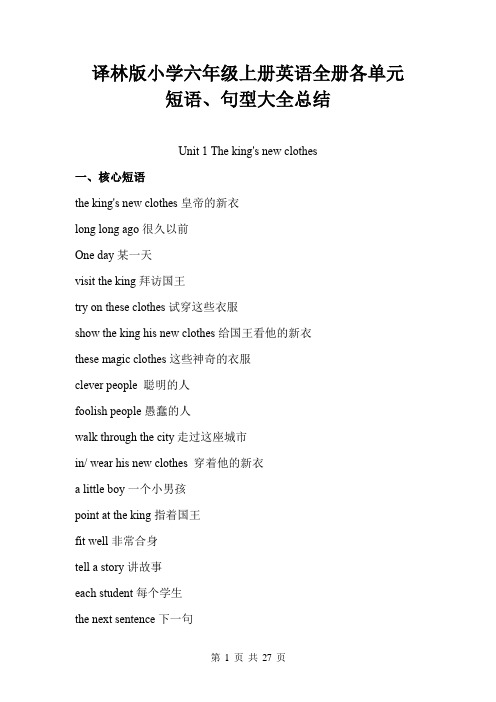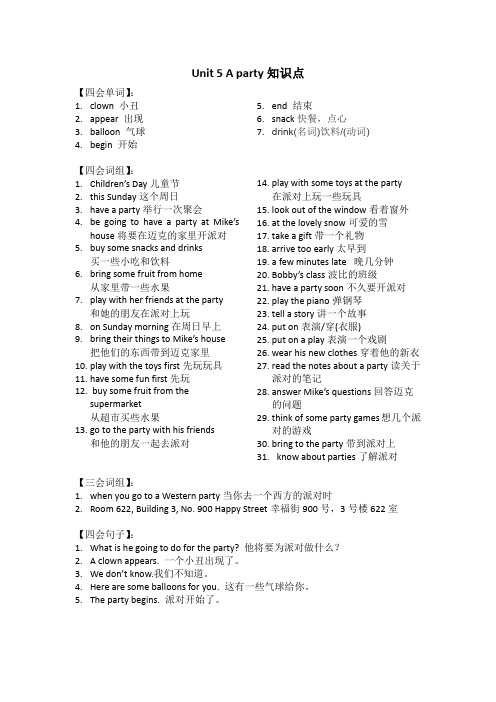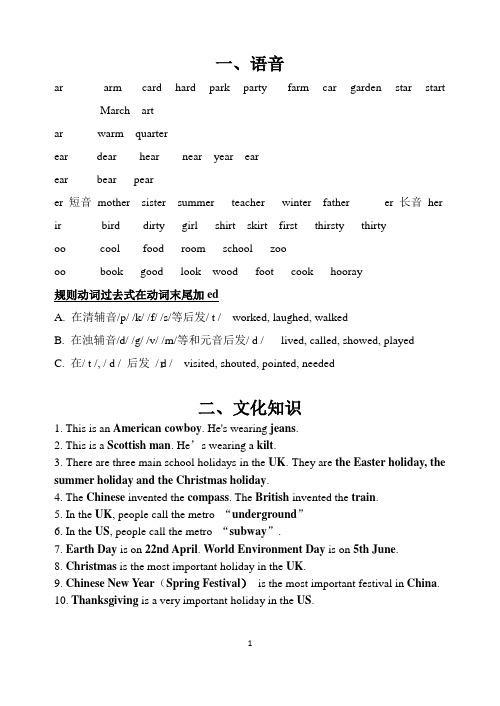[译林版]六年级英语复习资料 (短语固定搭配)
译林小学英语六年级U7—U8重点词汇短语

U 7 Protect the Earth 一、重点词汇短语复习1.protect the earth2.save watereful water4.drink water and use watere water to clean things6.in many place7.waste water8.save energy9.reuse and save it10.save energy11.most ofe from13.there is not much coal or oil on earth14. a lot of15.cut down16.make tables; make bags and bottles;17.too many18.other things19.Don’t use too much plastic20.is bad for21.plastic bags or bottles22.paper bags and glass bottle23.really cool24.Earth Day25.World Environment Day26.do a project27.tell sb. about sth.28.tell sb. to do sth.29.start drawing30.a rubbish bin31.on the trees在树上(长在上面的)32.in the tree在树上(不是长在上面的)33.be ready for34.at the school gate35.to protect the Earth36.how to protect the Earth二、单元语法1.We use water to clean things.We use wood to make tables,chairs and other things.“use...to”表示用...做...。
六年级下册英语素材-Unit 1 The lion and the mouse 知识点总结以及语法详解 译林版

Unit 1 The lion and the mouse基础知识点总结以及语法细讲★老鼠的复数mice; 鼠标的复数mouses一,词组短语1.in the forest 在森林里rge and strong又大又壮3.★one day 一天4.walk by路过5.★wake …up 唤醒(wake sb up) ★6. be angry 生气7.want to eat the mouse想要吃这只老鼠8.★some day 某一天9.small and weak又小又弱10.let sb. do 让某人干某事11.let the mouse go 让这只老鼠走开★12.the next day 第二天13.catch the lion with a large net用一张大网抓住狮子14.bite the net with his sharp teeth用它锋利的牙齿咬网15.get out 出去16.get out from the net从网中出来★17. just then就在那时18.make a big hole in the net在网上做了一个大洞19.★from then on从那时起20.become friends变成朋友21.help the lion get out帮助狮子逃脱22.s ay quietly平静地说ugh loudly大声地笑24.a sk sadly伤心地问25.say happily高兴地说ugh happily开心地大笑27.a happy boy 一个快乐地男孩★28. sweet shop甜品店29. Aesop’s Fables.[ˈi:sɔps ˈfebəlz ]伊索寓言30. Chinese idiom book汉语成语书31. play ...happily玩得很开心32.★be good at table tennis乒乓打得好33.★cheer for them loudly大声地为他们喝彩34. ★hit the ball hard用力击球35. ★find a hole in the ground发现了地上的一个洞36. too deep太深37. reach it(到达)触碰到它38. have an idea有一个主意(想法)39.bring some water quickly很快带来一些水40.p our it into the hole把它倒进洞[pɔ:]41. ★pour … into 把……倒进42. help him up帮他上来43.go to him去他那里(寻求帮助)44. become happy 变得开心45. look sad看起来伤心二.词块拓展:★ 1.wake …up 唤醒(wake sb up) wake up 醒来; 唤醒, 弄醒; 活跃起来; 激起, 引起Please wake me up at six. 请在六点钟叫醒我。
(完整版)新版译林英语六年级下册知识点整理

2016 年教林版小学六年英下册元知6B Unit 1 The lion and the mouse知一、四会rge 大的2. strong 壮的3. quietly 寂静地;小声地4. Weak 衰弱的5. loudly 高声地6. happily 高兴地;高地二、三会老鼠 mouce 复数 mice 走,路 walk by 吵醒,叫醒 wake ⋯up某一天 same day 放不可以,松开 let ⋯ go次日 the next day网 net 咬 bite 利的,尖的 sharp 地,心地 sadly 就在那 just then 不久,很快 soon 从那起 from then on 呼 cheer 打, hit 深的 deep 得着reach快速地,快地 quickly 把⋯⋯倒入 pour ⋯into三、短累子和老虎 the lion and the mouse mouse: 复数 mice辨析 mouth 嘴巴month 月份又大又壮 large and strong又小又弱 small and weak走⋯ walk by 走丛林 walk by the forest把子叫醒 wake the lion up (代格放中 ) wake me up我能在某一天帮助你 I can help you some day未来不确立的某一天 Some day:寂静地 say quietly quiet →quietly高声地笑道 laugh loudly loud →loudly子走 let the mouse go let sb do次日 the next day用一个大网抓住子 catch the lion with a large net catch 去式 :caught用他的利的牙咬网bite the net with his sharp teeth (tooth)bite 去式 : bit出来 get out心地道 ask sadly sad→sadly就在那个候 just then高兴地 say happily happy→happily从那起 from then on成好朋友 become good friends become +形容得如何⋯糖果店 sweet shop一个棒棒糖 a lollipop他会什么 ? what will he say?没关系 It doesn ’t matter.伊索寓言 Aesop’s Fables一本中文成 a Chinese idiom book高兴地打 play table tennis happily擅 be good at+名 // be good at +ing高声地他呼cheer for them loudly cheer for ⋯ 呼球使劲 hit the ball hard hit 打,(去式 : hit):最后 finally近意: at last太深too deep我不到 I can ’t reach it reach 抵达reach my school快速地拿一些水来bring some water quickly把它倒洞里 pour it in the hole干得好! Well done 四、四会句子The mouce said quietly. 老鼠小声地。
(完整版)译林小学英语6A,6B知识点,推荐文档

(完整版)译林⼩学英语6A,6B知识点,推荐⽂档六年级知识点总结六上Unit 1 The king’s new clothes句型1.Long long ago, there was a king. 很久很久以前,有⼀位国王。
2. The king was happy. 国王很开⼼。
3. He liked new clothes. 他喜欢新⾐服。
4. Two men visited the king. 两个男⼈拜访了这位国王。
Unit 2 What a day!句型:1、今天的天⽓怎么样?是晴朗的。
A: How’s the weather today? B: It’s sunny. The weather is sunny.2、昨天的天⽓怎么样?是下⾬的。
A; What was the weather like yesterday?B : It was rainy. The weather was rainy.3、我看见⼀些有趣的鹦鹉。
We saw some interesting parrots.4、我们上周⽇放风筝了。
We flew kites last Sunday.5、昨天他带来了⼀些饮料,⾯包和蜂蜜。
He brought some drinks, bread and honey yesterday.6、两天前她带来了⼀些⽔饺。
She brought some dumplings two days ago.7、昨天下⾬了。
It rained yesterday.8、 Why do you have it?你怎么会拿到它的?语法1、过去时态:本课出现的动词不规则变化give- gave lose- lost become- became hold- held come- came bring- brought buy- brought see- sawwrite- wrote can- could find- found meet- met fly- flew2、rainy - 下⾬的(形容词)3、snowy- 下雪的(形容词)rain snow(1)名词:⾬(不可数): a lot of rain (1)名词:雪(不可数): a lot of snow (2)动词:下⾬(2)动词:下雪Unit 3 Holiday fun动词过去式catch---caught eat---ate get---got meet---metlose---lost hold---held find---found重点句型:1. What did you do for the holiday?2. How was your holiday? It was great fun.3. Why did you call me?Because I wanted to give the fish to you.4. What great fun!5. It is time for dinner.Unit 4 then and now句型1. What day is today? = What day is it today? 今天星期⼏?What’s the date today?今天⼏⽉⼏号?(the 19th of September 九⽉⼗九号)2. Six years ago, Mike could read and draw, but he could not write.Now he can do many things.六年前麦克会阅读和画画,但是他不会写。
译林牛津版六年级知识点整理

精心整理知识点归纳班级:姓名:句子时态归纳一、一般现在时(句子中通常有always,usually,often,sometimes,never,every…,onMondays/…)1、句型结构:主语+V.(s)如果主语是三单,谓语动词加s或者es.2(1(2(3(412(1(2(3put—12(1(2e.g.stop–stopped,shop–shopped(3)原形与过去式同型e.g.read-read,hit-hit,put-put,let-let,cut-cut,lose—lost(4)以辅音+y结尾去y变i+ede.g.copy-copied,cry-cried,study-studied,become-became(5谓语动词结构是:begoingto+do(表示计划、打算做…)或者will+do(表示即将发生…)句型结构:主语+begoingto/will+V.原形’t后面,(试着动词如:help(helpme)/let(letus)/make(you)…介词如:for(me)/from(him)/to(you)…名词使用1、alotof,lotsof,some,afew,many,howmany后面加可数名词复数,alotof,lotsof,some,alittle,much,howmuch后面加不可数名词。
(1)一般情况,+s(2)名词以s、x、sh、ch结尾,+es(3)名词以“o”结尾,有生命的+es(如potato—potatoes);无生命的+s(如photo—photos)(4)名词以“y”结尾,元音(a,e,i,o,u)+y结尾——直接+s;辅音+y结尾——去y变i+es(5)名词以“f”/“fe”结尾,去f/fe变ve+s(61.2.3.12、3、-ist结尾:piano---pianist,science---scientist,art---artist,牙医dentist4、-man结尾:post---postman,milk---milkman,space---spaceman,fire---fireman___5、男/女职业:police---policeman(男),police---policewoman(女)act---actor(男),act---actress(女)wait---waiter(男),wait---waitress(女)6、医生doctor,护士nurse,农民farmer,宇航员astronaut7、China中国-Chinese中国人America美国-American美国人France法国-French法国人theUK英国-British英国人England英国-English英国人Australia澳大利亚-Australian澳大利亚人Japan日本-Japanese日本人theUS/America美国-American美国人句型转化一、一般疑问句做法:(1)有Be动词(am\is\are\was\were)时,将Be动词提到句首,剩余部分照抄;(2)有情态动词can/would/must/will/should时,将can/would/must/will/should提到句首,剩余部分照抄;(3词(4(1(2)didn’t.(1、It’e.g.It’2、3、4、5、6、7、8、e.g.Wheredoyoucomefrom?=Whereareyoufrom?IcomefromChina.=IamfromChina.9.What+名词短语!=How+形容词+名词!e.g.Whatanicebook!=Hownicethebookis!10.begoodat=dowellineg:I’mgoodatplayingbasketball.=Idowellinplayingbasketball.11.lookafter=takecareofEg:Youshouldlookafteryourlittlesister.=Youshouldtakecareofyourlittlesister.12.Hewalkstoschooleveryday.=Hegoestoschoolonfooteveryday.几点补充说明1、excited用来形容人,exciting用来形容事物,excitedly用来形容人的动作。
译林版小学六年级上册英语全册各单元短语句型大全总结

译林版小学六年级上册英语全册各单元短语、句型大全总结Unit 1 The king's new clothes一、核心短语the king's new clothes皇帝的新衣long long ago很久以前One day某一天visit the king拜访国王try on these clothes试穿这些衣服show the king his new clothes给国王看他的新衣these magic clothes这些神奇的衣服clever people 聪明的人foolish people愚蠢的人walk through the city走过这座城市in/ wear his new clothes 穿着他的新衣a little boy一个小男孩point at the king指着国王fit well非常合身tell a story讲故事each student每个学生the next sentence下一句think hard努力地想have to不得不in front of the house在房子前面;walk by the house步行经过房子shout at the old man对着老人大喊give me your child 把你的孩子给我be nice to her对她很好look after him照顾他turn into a prince变成王子二、重点句型1. My king, we can make new clothes for you.我的国王,我们可以给您做新衣服。
【解析】can为情态动词,后面跟动词原形;“make sth.for sb."意为“为某人制作某物",for为介词,后面如果跟人称代词需要用其宾格形式。
My mother can make dresses for me.我妈妈可以给我做连衣裙。
They are making a birthday cake for Su Hai.他们正在为苏海制作一个生日蛋糕。
译林版英语六年级下学期第五单元知识点

Unit 5 A party知识点【四会单词】:1.clown 小丑2.appear 出现3.balloon 气球4.begin 开始5.end 结束6.snack快餐,点心7.drink(名词)饮料/(动词)【四会词组】:1.Children’s Day儿童节2.this Sunday这个周日3.have a party举行一次聚会4.be going to have a party at Mike’shouse将要在迈克的家里开派对5.buy some snacks and drinks买一些小吃和饮料6.bring some fruit from home从家里带一些水果7.play with her friends at the party和她的朋友在派对上玩8.on Sunday morning在周日早上9.bring their things to Mike’s house把他们的东西带到迈克家里10.play with the toys first先玩玩具11.have some fun first先玩12.buy some fruit from thesupermarket从超市买些水果13.go to the party with his friends和他的朋友一起去派对14.play with some toys at the party在派对上玩一些玩具15.look out of the window看着窗外16.at the lovely snow可爱的雪17.take a gift带一个礼物18.arrive too early太早到19.a few minutes late 晚几分钟20.Bobby’s class波比的班级21.have a party soon不久要开派对22.play the piano弹钢琴23.tell a story讲一个故事24.put on表演/穿(衣服)25.put on a play表演一个戏剧26.wear his new clothes穿着他的新衣27.read the notes about a party读关于派对的笔记28.answer Mike’s questions回答迈克的问题29.think of some party games想几个派对的游戏30.bring to the party带到派对上31.know about parties了解派对【三会词组】:1.when you go to a Western party当你去一个西方的派对时2.Room 622, Building 3, No. 900 Happy Street幸福街900号,3号楼622室【四会句子】:1.What is he going to do for the party? 他将要为派对做什么?2. A clown appears. 一个小丑出现了。
译林版小学英语6A六年级上册知识点汇总复习资料

一、语音ar arm card hard park party farm car garden star start March artar warm quarterear dear hear near year earear bear pearer 短音mother sister summer teacher winter father er 长音her ir bird dirty girl shirt skirt first thirsty thirtyoo cool food room school zoooo book good look wood foot cook hooray规则动词过去式在动词末尾加edA. 在清辅音/p/ /k/ /f/ /s/等后发/ t / worked, laughed, walkedB. 在浊辅音/d/ /g/ /v/ /m/等和元音后发/ d / lived, called, showed, playedC. 在/ t /, / d / 后发/ɪd / visited, shouted, pointed, needed二、文化知识1. This is an American cowboy. He's wearing jeans.2. This is a Scottish man. He’s wearing a kilt.3. There are three main school holidays in the UK. They are the Easter holiday, the summer holiday and the Christmas holiday.4. The Chinese invented the compass. The British invented the train.5. In the UK, people call the metro “underground”6. In the US, people call the metro “subway”.7. Earth Day is on 22nd April. World Environment Day is on 5th June.8. Christmas is the most important holiday in the UK.9. Chinese New Year(Spring Festival)is the most important festival in China.10. Thanksgiving is a very important holiday in the US.三、四会单词开始__________笑__________穿__________讲,叙述__________说__________ 下一个__________小的__________机会___________孩子__________晴朗的__________变成,成为__________有风的__________多云的__________天空__________带来__________饮料_________多雨的__________遇见___________出什么事了?____________________假日,假期___________国庆节__________________长城_______________纸___________兴奋的___________问___________瓶子____________报纸____________以前__________开始(词组)__________ 使用__________办公室__________新闻___________观看___________电子书____________用___________昨天____________标识____________意思是____________购物中心____________小心____________地面____________在…周围___________请勿停车。
- 1、下载文档前请自行甄别文档内容的完整性,平台不提供额外的编辑、内容补充、找答案等附加服务。
- 2、"仅部分预览"的文档,不可在线预览部分如存在完整性等问题,可反馈申请退款(可完整预览的文档不适用该条件!)。
- 3、如文档侵犯您的权益,请联系客服反馈,我们会尽快为您处理(人工客服工作时间:9:00-18:30)。
六年级英语复习资料 (短语固定搭配)Name : (1).加动词原形(do )can/can’t + 动词原形 should/shouldn’t+动词原形 may+动词原形 must/mustn’t+动词原形 Will/won’t+动词原形 do/does/did+动词原形 help+动词原形have to+动词原形Shall we +动词原形祈使句动词原形开头 need +to+DO 动词原形 would like +to+动原 be happy +to+DO 动原 Let +宾格+DO 动词原形 use… to+DO 动词原形 It’s time +to+DO 动词原形can’t wait to+DO 动词原形to +动词原形(3).+动词ing (doing ) be+动词ing no+动词ing go+动词ing like+动词ing love+动词ing start+动词ing begin++动词ing stop+动词ing how about/what about+动词ingbe good at+动词ingdo well in+动词ing介词+动词ing不是祈使句,放在句子开头的动词要加ing 即动名词作主语。
例:Reading is important.(4).后面跟形容词的动词有:be sick, keep clean, look happy, feel sorry, get angry, stay calm, become windy, smell nice, sound good, turn red.(5). 量词:a lot of 许多/some 一些+ 可数名词复数或不可数名词( a lot 许多,后面不再跟名词,Don’t eat a lot. 不要吃太多)a lot of noodles/bread 许多面条/面包 some vegetables/water 一些蔬菜/水 a few 几个+可数名词复数 a few eggs 几个鸡蛋a little 一点+不可数名词 a little cola 一些可乐针对上述量词提问用how many (多少)many 许多+可数名词复数 many toys 许多玩具much 许多+不可数名词 much tea 许多茶too many 太多+可数名词复数 too many students 太多学生too much 太多+不可数名词 too much milk 太多牛奶(6) . the 的用法不加the1. 球类前面不加the play football/table tennis 踢足球/打乒乓球2. 月份前面不加the in January/February 在一月/在二月加the3. 乐器前面加the play the piano/guitar 弹钢琴/吉他4. 四个传统节日加the the Spring Festival 春节构成专有名词的所有单词开头要大写Dragon Boat Festival 端午节Mid-Autumn Festival 中秋节Double Ninth Festival 重阳节5. holiday 前加the the National Day holiday 国庆节(on holiday 度假中,没有the )6. 景点前加the the Bund (上海)外滩the Shanghai Museum 上海博物馆the Great Wall 长城the Palace Museum 故宫the Summer Palace 颐和园(Tian’anmen Square 前面不加the)7. 序数词前加the on the second floor 在二楼the third girl第三个女孩日期:the +序数词+of +月份8. 其他the next day 第二天(7)in 的用法1. 在…里/上in the kitchen 在厨房in the forest 在森林里in the playground 在操场上in the tree 在树上(指不长在树上) on the tree 在树上(指长在树上的) the monkeys in the tree 树上的猴子the apples on the tree 树上的苹果2. 时间in the morning/afternoon/evening 在早上/下午/晚上in May / June 在五月/六月in three days 三天内in the future 在将来/未来3. 其它in a healthy diet 在健康的饮食in your meals 在你的餐点中go in 进入in front of 在…前面(方位上的) before 在……之前(时间上的) in front of the house 房子前面before bedtime 睡前(8)on的用法1. 某一天前用on1) on Monday/Tuesday/Wednesday/Thursday 在周一/周二/周三/周四2) on the second of March 在三月二日3) on Mother’s Day 在母亲节4) on your birthday 在你生日2. 某一天的早中晚on Friday morning在周五早上on Saturday afternoon在周六下午on Sunday evening在周日晚上on Chinese New Year’s Eve 在除夕夜3. 其它on your left/right 在你左边/右边put on 穿上(take off 脱下)put on a play 上演/表演一出戏try on 试穿get on 上车(get off下车)from then on 从那时起go on 继续(go well 进展顺利)(9)at的用法1.时间at eleven (o’cloc k) 在十一点at night 在夜里at weekends 在周末at a time 一次at Christmas 在圣诞节at Chinese New Year 在中国新年(节假日的词组中本身没有day的,就用at)at this festival 在这个节日at first 起先,最初at last 最后2. 地点at school 在学校at home 在家at Mike’s house 在麦克家at the party 在派对at a snack bar 在小吃店at a shopping centre 在购物中心at Park Station 在公园站at the train station 在火车站at the bus stop在公交车站at the traffic lights 在交通信号灯处at the school gate 在校门口3. 其它point at…指着(近)point at the king 指着国王point to…指向(远)point to the sign on the grass 指着草地上的标志laugh at 笑,大笑(laughed过去式) laugh at me 笑我shout at 朝……喊shout at that old man 朝那个老人喊(10)V. sb. sth.=V. sth. to sb.1. show sb. sth. = show sth. to sb. 给某人看某物/向某人展示某物show me your new clothes=show your new clothes to me 为我看你的新衣服2. give sb. sth. =give sth. to sb. 给某人某物/把某物给某人give him a book = give a book to him 给他一本书/把一本书给他3. send an email to her = send her an email 给她发封邮件/发封邮件给她4. write letters to them = write them letters 给他们写信/写信给他们(11)句型What ….? 询问什么,用具体的事情回答。
Where… ?询问地点,用地点回答。
When(What time)….? 询问时间,时间回答。
Who… ? 询问某人,回答要用某人来回答。
(Who是单数,Who is the tall man ? He’s my father .Who runs fast ? Mike does. )Whose …? 询问是谁的,要用某人的回答。
How… ? 1. 询问方式,交通工具2. 询问身体状况3. 询问过得如何,假期等。
How many ….? 询问数量多少,要用数字或者数量词来回答。
How much …? 询问价钱,要用…yuan 来回答。
How old …? 询问年龄,用年龄(数字)回答。
Why… ?询问原因,要用because回答。
What day …? 询问星期,用星期回答。
What date…? 询问日期,用日期回答。
What’s +地点?There be 回答。
(there be句型中的提问用What’s,即使回答是复数) (there be 临近原则,无论出现多少东西,只看第一样是单复数还是不可数)What’s this/that ? It’s a/an 回答。
What’s wrong with …? ……怎么样?疾病回答。
What would you like ? I’d like ….Would you like some cakes? Yes, please./ No, thank you.Would you like to join us ? Yes, I’d like(love) to.打电话:Who’s that ? 你是谁?This is Nancy speaking. 我是南希。
祈使句,动词原形开头,否定前面加don’t感叹句:What (a) + 名词! What a great sentence ! What beautiful clothes!How +形容词+ 名词+ be ! How big the cake is !It’s time for+ 名词。
It’s time for breakfast . 是早饭时间了。
It’s tim e to + 动词原形。
It’s time to have dinner. 是吃晚饭的时间了。
any, or , either(也) 用于问句或否定句(12)交通工具介词短语动词短语步行on foot walk I go to school on foot. I walk to school 乘公交车by bus take a bus I go home by bus. I take a bus home. 骑自行车by bike ride a bike乘地铁by metro take a metro乘出租车by taxi take a taxi乘飞机by plane take a plane乘小汽车by car take/ drive a car乘轮船by ship take a ship乘船by boat take a boat(13)其它固定搭配1. looklook at 看……(= have a look at ) look at the blackboard 看黑板look for 寻找(强调过程) look for my kite 寻找我的风筝find找到(强调结果) find my kite 找到了我的风筝look after 照顾look after their grandparents 照顾他们的爷爷奶奶take care of 爱护;照顾take care of children’s teeth 照顾孩子们的牙齿care about 关心,在乎care about our teeth 关心/在乎我们的牙齿look out 当心Danger! Please look out . 危险!当心!look out for 当心,提防look out for cars 当心汽车look out of …朝……看look out of the window 朝窗外看2. here/there/home/ upstairs/ downstairs 前面没有to 地点副词come here 过来go there 去那儿get there 到达那come/go home 回家get home 到家walk home 走回家例外:go to your home 去你家get to my home 到我家3. walkwalk on 继续走walk by 走过,路过walk through 穿过4. upwake…up 吵醒,叫醒wake the lion up 吵醒狮子pick …up 捡起pick it/them up 把它/它们捡起来(代词it,them 放中间) climb up 爬上climb up the hill 爬上小山get up 起床5. awayfly away 飞走drive…away 赶走go away 走了,离开move…away from …从…搬走6. into/ontopour…into 把……倒入go into 走进,进入hold onto 抓紧take…into…带入……turn into变成7.其它词:about, with, from, for, around 等cheer for…欢呼cheer for them为他们欢呼ask…for help 向……求助ask me for help向我求助be good for…对……有益be good for your body 对你的身体有益be bad for… 对……有害be bad for your eyes 对你的眼睛有害be late for… 迟到be late for school 上学迟到be ready for… 准备好…… be ready for class 准备好上课buy …for… 为……买……buy a present for my friend 为我的朋友买个礼物buy…from… 从…..买…… buy things from shops 从商店里买东西make….for….为….做…… mak e a card for your mother 为你妈妈做张贺卡write… for… 为……写…… write stories for children 为孩子们写故事wait for… 等待…… wait for the bus 等公交wait for me 等我read newspapers for news读报获取新闻watch news on the Internet 网上看新闻bring…for… 为……带…… bring a book for me 为我带本书bring…to…带……去…… bring snacks to the party 带零食去派对bring…from…从……带…… bring some fruit from home 从家里带些水果get … from… 从……得到……get red packets from my grandparents从我祖父母那得到红包be afraid of … 害怕…… be afraid of bears 害怕熊be/go on an outing 远足have a picnic 野餐far from 离……远come(be) from 来自make a sentence with …用……造句play with… 和……一起玩show …around 带……参观travel around the world 环游世界learn about… 学习…… talk about… 谈论……tell you about The UK 告诉你关于英国的事be excited about 对……兴奋ask …about…. 问….关于…… ask Sam about Bobby 向山姆问关于鲍比的事ask me about the book 向我问那本书leave … behind 留下,丢下find out 发现come out /get out 出来just then 就在那时just right 正合适,正好。
